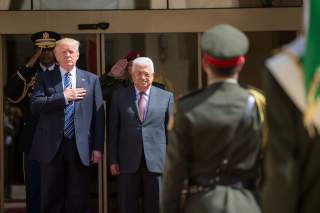Trump's Trip to Israel Built Hope, But May Not Bring Change
Most of what Trump said publicly on his overseas trip came as music to Israeli ears after eight years of the Obama presidency.
It had to be awkward for Mahmoud Abbas, standing next to him. In essence, President Trump was also calling Palestinian terrorists losers. The fact that streets and squares throughout the Palestinian Authority are named after terrorists might as well have been painted on the podium. Since it wasn’t, Netanyahu was sure to remind all as he spoke briefly before Trump an hour later at the Israel Museum.
“Standing next to you, President Abbas condemned the horrific attack in Manchester. Well, I hope this heralds a real change,” Netanyahu said. “Because, if the attacker had been Palestinian, and the victims had been Israeli children, the suicide bomber’s family would have received a stipend from the Palestinian Authority. That’s Palestinian law. That law must be changed.”
It was a drop-the-mic moment for Netanyahu, as the issue of Palestinian payments to terrorists’ families happened to be the main concession from the Palestinian Authority he was publicly seeking before Trump’s visit. The unfortunate terrorist attack in Manchester provided an exclamation point.
Trump Being Trump
No trip to Israel would be complete without some Trumpisms rising to the surface and he did not disappoint. The president took an opportunity to blurt out to reporters before his private meeting with Netanyahu, “I never mentioned the word or the name Israel. Never mentioned it during our conversation. They're all saying I did,” he said, “so you had another story wrong.” He was referring to the May 10 Oval Office meeting with the Russian foreign minister and ambassador in which he was alleged to have shared top-secret information with Russia. Reports later claimed that the intelligence came from an Israeli source. Trump’s comment, therefore, more or less confirmed the reports that he had been denying.
In the Israeli version of “Trump Says the Darndest Things,” was the priceless episode with the reaction of Israel’s ambassador to the United States, Ron Dermer, when President Trump told those assembled, “We just got back from the Middle East—back from Saudi Arabia and we were treated incredibly well.” Dermer pulled his head back, ran his hands through his hair and the expression of “Did he just say that? Does he know where he is?” is clearly written on his face. Certainly not the best poker face, but it was very brief and he regained his composure quickly.
Overall, most of what President Trump said publicly came as music to Israeli ears after eight-years of the Obama presidency. And Netanyahu can rejoice that a rogue committee in his own government didn’t take the opportunity to announce plans for settlement construction as happened when Vice President Biden came to Israel in 2010.
American presidents appear addicted to solving the Palestinian-Israeli conflict even though its centrality in Arab politics has been receding for decades and its solution rates fairly low on the list of America’s Middle East priorities. The fact that the pathway to peace is strewn with so much wreckage should also dissuade most from high-stakes peace poker. The quest for the modern-day Holy Grail appears to be far more about presidential legacy making.
When Egypt wanted peace, their president, Anwar Sadat, kicked out the Soviet advisers, flew to Jerusalem and made peace with Israel. When the late Syrian president Hafez al-Assad decided he wanted a process of peace but not the peace itself, he had a decade-long process during the 1990s and sealed no peace. When Palestinian leaders emerge who want peace and recognize Israel’s existence as a Jewish State, they’ll make peace. Everything else is a photo op and contest to win the game of narratives. Israel fared pretty well in this round.
Matthew RJ Brodsky is a senior Middle East analyst at Wikistrat and former director of policy at the Jewish Policy Center in Washington, DC. He can be followed on Twitter: @RJBrodsky
Image: President Donald Trump with President Mahmoud Abbas of the Palestinian Authority. Flickr/The White House

